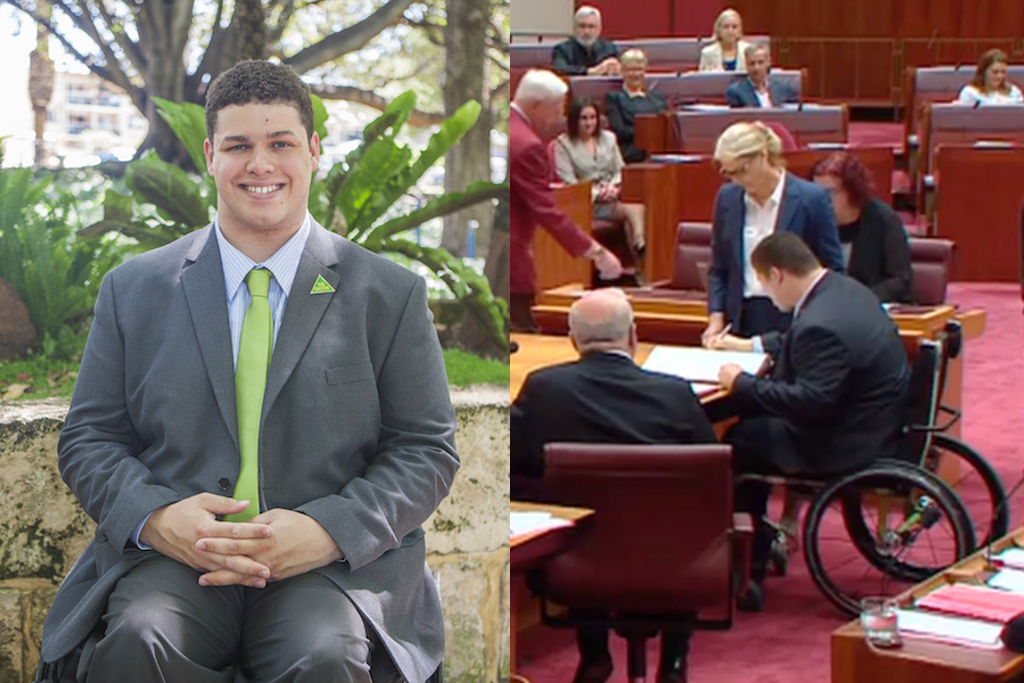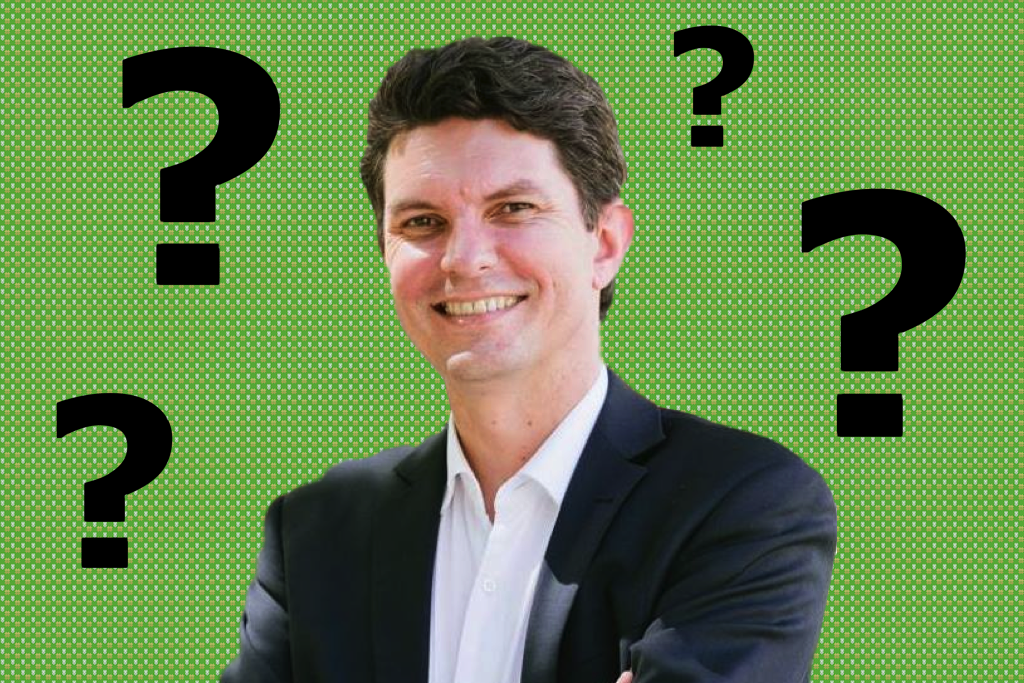Meet Jordon Steele-John: The 23-Year-Old Greens Senator Replacing Scott Ludlam
"I'm certainly not as fashion conscious as Scott.”

“When all this was kicking off, someone said to me, ‘Jordon, you’re about to fill some very large and fashionable shoes.’ And I think I can maybe do the large, but definitely not the fashionable. I’m certainly not as fashion conscious as Scott.”
That’s how Jordon Steele-John, sworn in today as Australia’s youngest ever federal senator (he’s 23), summed up the task of replacing Scott Ludlam — the beloved Greens senator felled in July by the ongoing dual citizenship crisis sweeping parliament.
He’s not wrong about them being big shoes to fill. Ludlam was unique: known for sledging our least favourite politicians, campaigning doggedly against metadata laws and the “digital illiterates” who snuck them through, having great hair, and so much more.
Steele-John is also pretty unique. He’s both the youngest senator ever and one of the first to have a visible disability — he has cerebral palsy, and uses a wheelchair. He’s also, by his own admission, “an outrageous political nerd” — he claims his interest in politics was first piqued by the Tampa affair in 2001, which sounds reasonable until you remember he was “about six” at the time. When pressed to sum himself up, he says he “really likes campaigns, dinosaur-related materials, and general history nerd stuff to be honest.”
A New Voice
I spoke to Steele-John last Friday, just a few days before his swearing-in, to find out a bit more about our newest, youngest political representative. In our 20-minute conversation, he struck me as several things: a bit of a nerd, passionate, polite, and extremely well media-trained. His answers were friendly but somewhat canned, and he expertly dodged my attempts to draw out more detail on exactly what kind of policy he stands for.
He was more comfortable with broad brushstrokes: environment, youth and disability issues all got a mention as important policy areas for him, and he was articulate about why. Climate change, for example, is for him an issue of intergenerational theft — as both a young person and a Greens senator, he’s well placed to help “represent and recognise the urgency” of such a problem in a parliament far too relaxed about it.
“Disability exists because the society in which we live fails to accurately adapt to everybody’s differing levels of ability.”
On disability issues in particular, he noted that “there’s never before been somebody in the Senate who actually has skin in the game, if you like”. While the fact that disability is often invisible makes me cautious to claim that Steele-John is indeed the first person with a disability to sit in parliament, he’s certainly the first wheelchair user to enter the space in a long while — the Senate chamber has had to have a ramp installed so he can actually get in there, and he’s been bloodying his knuckles on the building’s narrow doorways, which were not designed with wheelchairs in mind.
These experiences underline the key point about disability that he hopes to impress on people: “that disability is, in many ways, a societal construct. Which is to say that disability doesn’t exist because I have a medical condition which requires me to use a wheelchair; disability exists because the society in which we live fails to accurately adapt to everybody’s differing levels of ability. And it is in that failure where that disability is created, if that makes sense.”
“If we can understand that — if I can get that across to people — that will fundamentally change the way we think about and treat people like me,” he said.
The presence of diverse voices in our parliament is critical, and changing perceptions of disability is in itself a profoundly valuable contribution. But there is also the question of how, specifically, Steele-John’s perspective and values translate into meaningful policy-making — something he was much less clear on.
He was able to name the National Disability Insurance Scheme as an important policy to be debated, for instance, but declined to provide further specifics on what about the scheme he might target for change.
“Well, I’ve only kind of just recently got the keys to the door if that makes sense,” he told me apologetically, which makes perfect sense — he’s had only a whirlwind few months since Ludlam’s resignation to wrap his head around this whole being-elected-to-Senate thing. He also noted that the Greens have a disabilities spokesperson, to whom questions on NDIS specifics would be better directed.
The best he was able to give me in terms of specifics is that “we must make sure that [the NDIS] meets unmet needs and flags unmet need; it doesn’t force people to curtail their needs to a system that has failed.”
Is He Ready?
It’s tough, on the basis of a single 20-minute interview, to ascertain exactly why Steele-John is vague on policy. It could simply be the time constraint, or an unwillingness to step on the current disabilities spokesperson’s toes, or cautiousness born of media training, or sheer inexperience. After all, political nerd or no, Steele-John is 23, and wasn’t exactly planning on entering the Senate quite so soon.
On that note, there’s also the question of how long Steele-John will be sticking around. In July, sources in the WA Greens told Junkee it was likely that Steele-John would step aside later this year to allow the Greens to hold an open preselection for the Senate seat.
The frontrunner in the case of such a preselection looks to be Kate Davis, the principal solicitor at Tenancy WA, who has 20 years of experience in the party. She’s just announced her nomination to be the WA Greens’ Senate candidate in the next federal election. Steele-John says he has also thrown his hat in the ring for preselection going forward — he’s taken time to think things through after being blindsided by Ludlam’s resignation, and has resolved that yes, he does want to do this, if the party will have him.
And if they won’t? “Obviously I’ll be personally disappointed as I guess you would be,” he said. “But I’ve been a member since I was 16 years old, and we’ll fully support whoever the membership choose.”
He was adamant, though, that he shouldn’t be seen as less of a contender due to his age, or inexperience on paper. “So many people assume there is an automatic correlation between age and life experience,” he said. “I think that there are people who are our age that have an incredible contribution to make. Not only in the political space, but elsewhere.”
His priority right now is making the most of the time he does have in parliament, however long that may be. It’s a chance for him to prove that view, to demonstrate that youth is no barrier to a valuable contribution.
“I’m focused on beginning the work of bringing these perspectives of youth and disability, which have never been seen in the parliament before, into the space, and getting the most value out of it.”
“But I would also say that, you know, my office and my staff and I will be open to anybody with issues and concerns or things that they want to float with us,” he concluded. “There’s no such thing as a safe Greens seat, and there is no such thing as a lazy Green MP.”
–
Sam Langford is Junkee’s staff writer. She tweets @_slangers.

